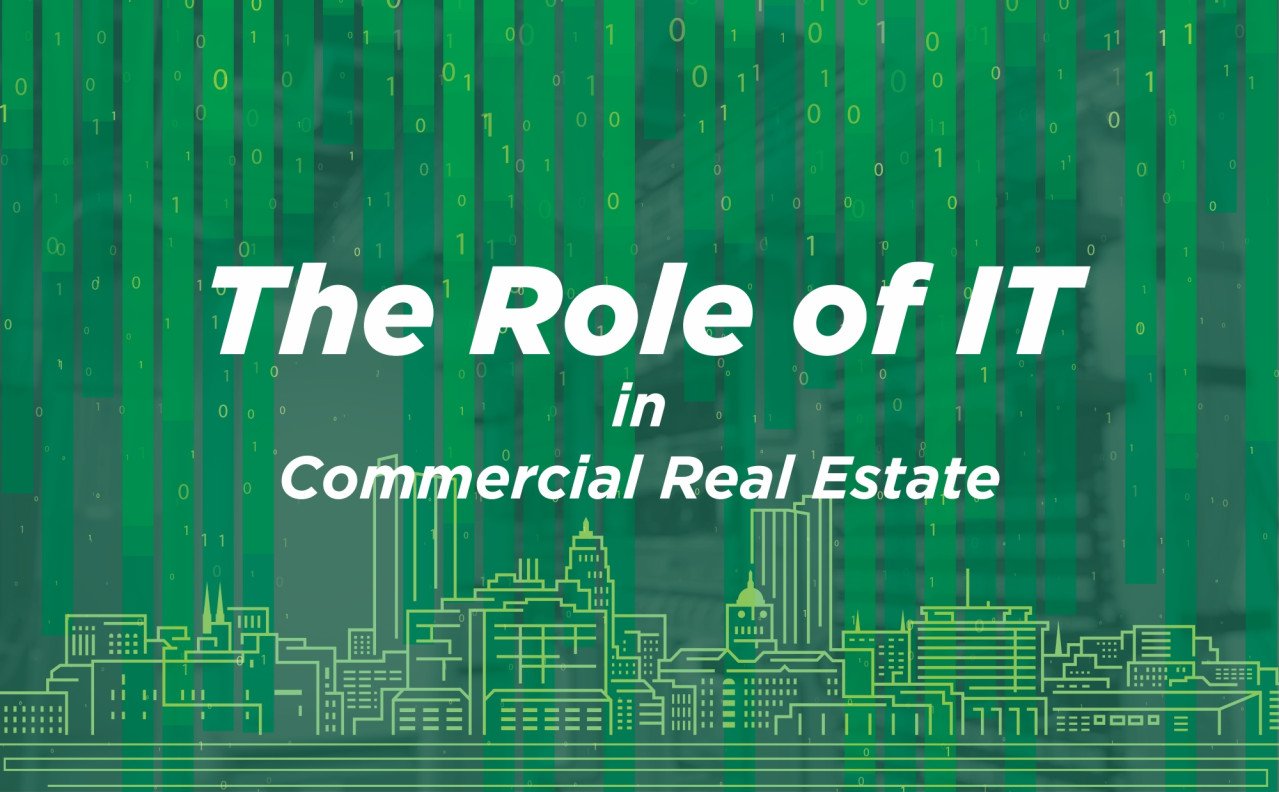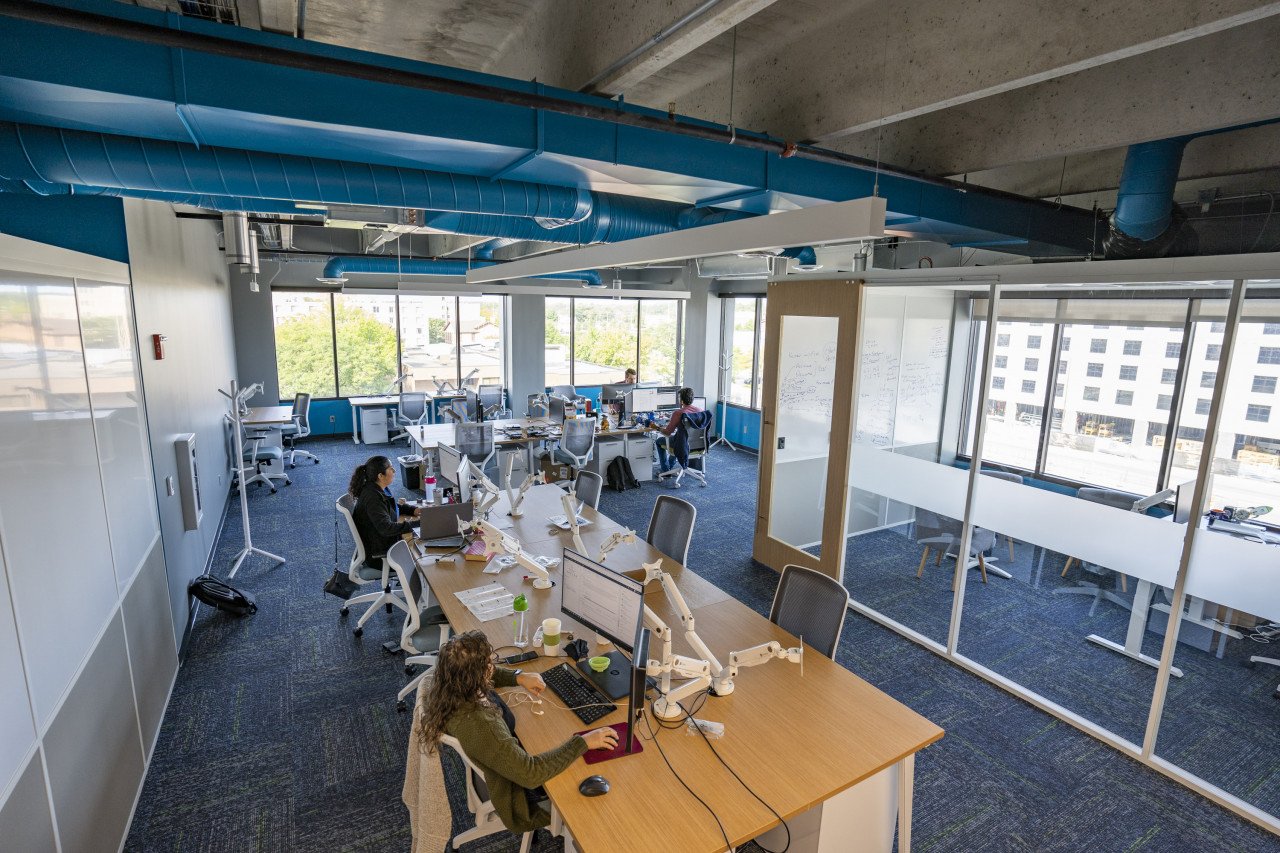The Role of IT in Commercial Real Estate

Technology plays a crucial role in shaping the experience of a tenant. It can secure the property and ensure efficient building management. Requirements and standards for IT solutions continue to increase as technology advances, from safety measures to basic organization and efficiency methods.
Let’s explore the critical role of IT in commercial real estate and see how it can help you stay secure, efficient, and organized.
IT keeps you secure.
Keeping your business safe as an owner is more complicated than you may think. Cybersecurity is not simply deleting a potential scam email and calling it a day. Be sure to consider both physical and digital safety measures.
IT-driven security camera systems are at the forefront of protecting both assets and occupants and offer several key advantages.
- High-resolution imaging: Advanced security cameras capture high-definition video, providing clear images vital to identifying incidents.
- Remote monitoring: IT integration allows security personnel to monitor camera feeds remotely from a centralized control room or via a mobile device. Potential incidents can be identified and addressed in real time even when security staff is offsite.
- Scalability: IT-managed security systems are highly scalable, allowing property managers to easily expand coverage as a building’s needs grow. You can either upgrade existing systems or add more cameras seamlessly.
Card access systems are another essential component of modern commercial real estate technology and security. They offer a range of benefits for both tenants and the property managers.
- Access control: Card access systems provide a secure and efficient way to manage who can enter specific areas of a building. Tenants can be issued personalized access cards that grant them entry to authorized spaces, while unauthorized people are denied access.
- Audit trails: IT-managed card access systems generate detailed logs of entry and exit activities, allowing property managers to monitor access patterns and identify potential security breaches. Audit trails are vital for investigating incidents and keeping compliant with security protocols.
- Customization: Access can easily be customized based on an individual’s role within an organization. For example, maintenance should have access to utility rooms while a tenant employee should only access their office floor.
IT maximizes efficiency.
IT services ensure that all technology systems run smoothly, securely, and effectively, which is essential for the functioning of modern commercial properties.
Managed IT service providers, also known as MSPs, offer continuous monitoring of all the IT systems within a commercial building.
- Proactive Maintenance: Being proactive rather than reactive when it comes to your building’s systems is vital to prevent major issues from occurring. By addressing issues early, MSPs help minimize downtime, prevent disruptions, and ensure that all systems are always functioning correctly.
- Flexibility: As commercial buildings evolve, IT evolves with them. MSPs offer the flexibility to scale resources up or down based on the building’s demands. Whether a building is adding new tenants, expanding its physical space, or simply upgrading, MSPs can adjust IT infrastructure accordingly, ensuring that all systems stay optimized.
Systems administration is the process of managing and maintaining an organization’s computer systems, including servers and workstations. Having a systems administrator for your commercial building can be very beneficial.
- Network infrastructure management: Systems admins are responsible for managing a building’s network infrastructure, including servers, routers, switches, and firewalls. They make sure the network is secure and reliable. A well-maintained network is the backbone of all IT services in a building.
- Software and hardware management: Systems admins oversee the deployment, configuration, and maintenance of all software and hardware within buildings. This includes everything from building management systems to tenant portals and security systems.
To avoid any major problems with your building’s systems, consider hiring a managed service provider or a systems administrator to keep things running smoothly and maximize efficiency within your commercial property.

IT keeps you organized.
Gone are the days when static, printed directories were enough for large commercial buildings.
Digital directories have now emerged as a crucial element in enhancing tenant experiences and improving building navigation, which keeps you, employees, and visitors organized.
- Improved navigation and convenience: Digital directories allow tenants and visitors to easily locate businesses, offices, and services within a building. Digital directories can provide fast, real-time updates, which is particularly beneficial in large offices or mixed-use developments where traditional directories quickly become cumbersome and outdated.
- Dynamic content: Unlike static directories, digital solutions are flexible and allow you to customize content according to specific needs. Property managers can tailor the interface to reflect the building’s or individual tenants’ branding. One might even incorporate advertising, announcements, weather, or emergency alerts, which keeps the directory relevant and informative.
Thus, the integration of IT into commercial real estate has transformed how properties are managed, secured, and experienced. From security camera systems to networks to digital directories, technology is at the heart of commercial real estate.
As commercial real estate continues to evolve, the role of IT will only become more significant. Building owners that embrace these technological advancements will not only improve the value, efficiency, and security of their properties but also offer a superior experience that sets them apart.






